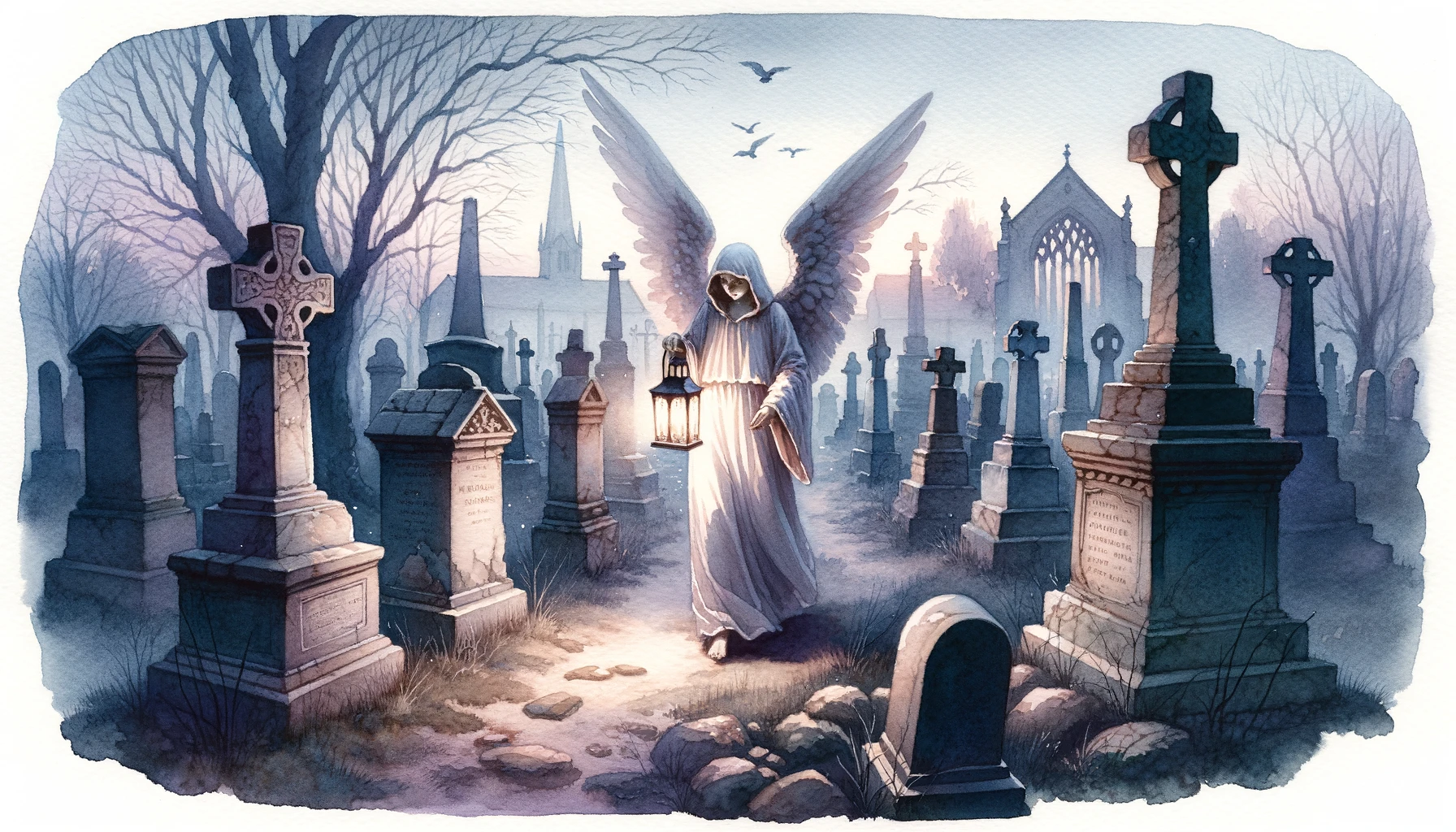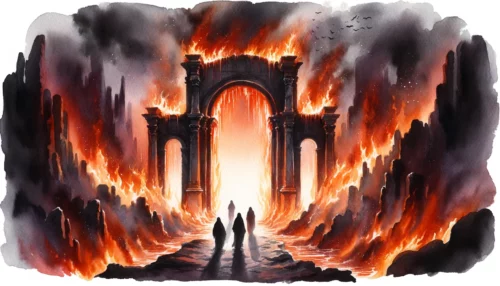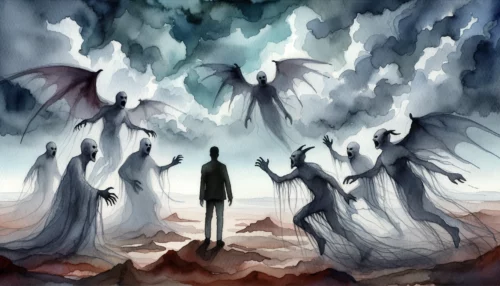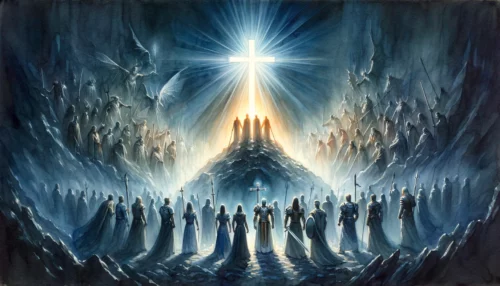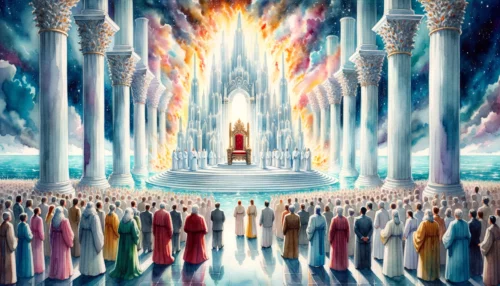Numerous religious texts, myths, and folklores reference a figure known as the Angel of Death, an entity responsible for the transition from life to death. Our understanding, as those who follow the teachings of the Bible, however, must be rooted in Scripture. It’s essential to discern whether the Bible truly speaks of such an angel and, if so, comprehend its nature and purpose within the divine narrative.
Understanding the Origin of the Angel of Death Concept
Diving into the realm of religious texts and mythologies, the idea of a specific entity, an Angel of Death, plays a central role in several belief systems. The term usually represents a supernatural being that guides the souls of the deceased towards their afterlife. While this concept might sound familiar and even intriguing, it’s worth pointing out that it primarily stems from outside the Judeo-Christian tradition.
Ancient cultures such as the Greeks spoke of Thanatos, a personification of death. In Islamic tradition, the angel Azrael serves this role. However, when we turn our focus towards the Christian tradition and the Bible, the situation becomes more nuanced.
The term “Angel of Death” doesn’t make a direct appearance in the Bible. Instead, the Bible offers various accounts of angels executing God’s judgement, which sometimes involves the death of individuals or groups. These instances have contributed to the development of the Angel of Death concept.
One notable biblical story that might have influenced this idea is found in the Book of Exodus. During the final plague upon Egypt, the Lord passed through the land to strike down every firstborn—both humans and animals (Exodus 12:29). But in the text, the entity carrying out this action isn’t explicitly called an “Angel of Death”. Some interpretations, however, suggest that it might be an angelic figure acting on God’s command.
In the New Testament, the Apostle Paul states that death is an enemy that will be destroyed in the end (1 Corinthians 15:26), not presenting it as an angelic being.
These references, coupled with cultural and religious influences over centuries, have shaped the concept of the Angel of Death that many are familiar with today. The Bible’s descriptions of angels executing divine judgment do not substantiate the existence of a single, specific Angel of Death.
The term “Angel of Death” doesn’t appear explicitly in the Bible, although angels do carry out divine judgments involving death in certain instances. Various accounts in the Scriptures, alongside cultural and religious influences, have contributed to the creation of the Angel of Death concept. Despite this, the Bible doesn’t support the notion of a distinct Angel of Death, but rather portrays death as an enemy to be defeated.
Biblical References to Death Angels
Let’s consider some significant biblical accounts where angels are involved in activities linked to death. These instances offer insights into the functions of angels in the divine order and their relationship with the concept of mortality.
The first notable reference is found in the Book of Genesis, in the narrative of Adam and Eve. After their disobedience, God sends cherubim—high-ranking angels—to guard the entrance to the Garden of Eden, preventing access to the Tree of Life and consequently condemning humanity to mortality (Genesis 3:24).
In the Book of Exodus, as already mentioned, God’s action of striking down the firstborn of Egypt is executed in a way that suggests an angelic involvement, though it’s not explicitly stated (Exodus 12:29). The story of King David’s punishment in the Second Book of Samuel also sees an angel inflicting death on a mass scale due to David’s disobedience (2 Samuel 24:15-16).
In the New Testament, the Book of Acts recounts an incident where an angel of the Lord strikes Herod Agrippa because of his arrogance, resulting in his death (Acts 12:23). In the Book of Revelation, angels play a significant role in carrying out God’s end-times judgments, which include death and destruction (Revelation 9:13-19).
Each of these instances presents angels as executors of divine judgment involving death. Yet, it’s clear from the contexts that these are not acts of independent will, but directives from God. These angels operate under the sovereignty of God, performing tasks assigned to them.
It’s also worth noting that these accounts do not present death as an entity, but rather as a consequence of specific actions—disobedience, pride, and judgment. Angels, in these narratives, are the executors of consequences, not harbingers of death in a personified sense.
The Bible has numerous references where angels execute divine judgment involving death, such as in Genesis, Exodus, Samuel, Acts, and Revelation. These accounts show angels acting on God’s command, highlighting their role as obedient servants within the divine order. Death is portrayed as a consequence of specific actions, with angels serving as executors of these outcomes, not as personifications of death. The Bible doesn’t present us with a single Angel of Death, but with instances where angels are involved in activities related to mortality as part of their obedient service to God.
The Theological Implications of an Angel of Death
Understanding the role of angels within the Christian faith has profound theological implications, especially when it comes to the concept of an Angel of Death. To analyze this idea, let’s focus on some key doctrines of Christianity.
From the Genesis narrative to the apocalyptic imagery of Revelation, angels consistently appear as agents of God’s will (Genesis 3:24, Revelation 9:13-19). Their actions are dictated not by personal choice, but by divine decree. This reinforces God’s sovereignty, underlining that all things, including death, are under God’s control. Angels merely execute His commands.
The concept of death in Christian belief is closely tied to sin. It was humanity’s disobedience in the Garden of Eden that led to mortality (Genesis 3:24). The Apostle Paul makes this connection explicit, stating that the wages of sin is death (Romans 6:23). Death, therefore, is not the domain of an angel, but the consequence of human sin.
Christian theology promises the ultimate defeat of death. Paul expresses in his letter to the Corinthians that the last enemy to be destroyed will be death (1 Corinthians 15:26). This promise doesn’t fit with the concept of an angel personifying death, as angels are created beings serving God, not enemies to be destroyed.
The centrality of Christ in the Christian faith is fundamental. Jesus, in His death and resurrection, conquers death (Romans 6:9). This accomplishment doesn’t involve battling a personified death or an Angel of Death, but overcoming the existential reality of mortality, thereby offering eternal life to all who believe in Him.
Theologically, the concept of an Angel of Death does not align with Christian doctrines. Angels in the Bible act as agents of God’s will, emphasizing His sovereignty. Death in Christianity is viewed as a result of sin, not the activity of an angelic being. Moreover, death is not personified as an enemy, but is described as an existential reality to be ultimately defeated, a victory achieved by Christ through His resurrection. As believers, our focus is on the life offered through Christ, transcending the limitations of mortality.
Light Overcomes Darkness
Our exploration of the Bible and the idea of an Angel of Death underlines the necessity of grounding our beliefs firmly in Scripture. It’s evident that while angels serve as agents of God’s judgment, leading sometimes to death, the Bible does not personify death as an angelic being. Death, as Christianity teaches, is a consequence of sin, not the realm of a divine messenger. The ultimate defeat of death comes not by the hand of an angel, but through the victory of Jesus Christ.
Reflect on these questions:
- How does the biblical perspective on death shape your understanding of life and mortality?
- What impact does the lack of an “Angel of Death” in Christian doctrine have on your comprehension of divine judgment?
- How does Jesus’ victory over death shape your faith and hope for eternal life?
Let the light of Christ guide you, for He is the one who conquered death. Through Him, we have the assurance of eternal life, where there is no room for fear or uncertainty. Let us find comfort and hope in His victory, knowing that our lives are in His hands, and there is nothing that can snatch us away from His love.




